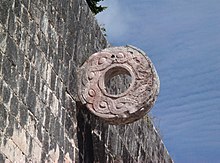Ulama (ball game)
Ulama (or Pok-ta-Pok ) was a ball game from various Indian cultures in Central America and a variant of the so-called Mesoamerican ball game .

history
The earliest known forerunners of the game, historical forms of the Mesoamerican ball game , are around 3000 years old. The word ulama comes from the Nahuatl word ullamaliztli (ball game). The name Pok-ta-Pok is derived from the sound that the ball makes when it bounces. According to Spanish sources, the original form of the Aztec game ulama included the subsequent sacrifice of the entire losing team, according to another reading of the winning team.
Others
A Mexican Pok-ta-Pok troupe made a guest appearance in Germany as the “Official Contribution of the Art and Culture Program to the 2006 FIFA World Cup ”.
See also
literature
- Max Hinderer, Jens Kastner (Ed.): Pok ta Pok. Appropriation - Power - Art. Turia + Kant publishing house, Vienna 2007, ISBN 3-85132-469-2 .
Video
- Peter Zurek: Pok Ta Pok. Play with the fire. arte 2006 (documentation).

